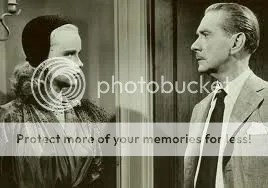
My partner described Clifton Webb as “always the best thing he’s in, whether or not that thing is good” and had fond memories of this film as absolutely hilarious, so we bought the DVD in the full knowledge that memory is a tricky thing and that the film might not be as good as recalled but that Webb would probably be worth watching. We were pleasantly surprised, then, to discover that the film was as funny as remembered.
The premise is that Thornton Sayre (Webb) is a stuffy literature professor at a stuffy school. He is perfectly happy with his lot in trying to instil high culture in, sometimes inadequate, young minds and his daughter Carol (Anne Francis) is on track to take after him, even down to aping his tweediness. This tranquil existence is thrown into turmoil when it is revealed that a television programme, “Dreamboat” is showing old silent movies of a (for the 1950s) racy nature and that the star of this series of movies, “Bruce Blair” is actually Thornton Sayre. The students mock him, and also Anne who takes the mockery particularly badly, and the school consider sacking Sayre if he cannot stop the broadcasts as they regard the publicity as damaging for the reputation of the school.
Sayre himself is determined to stop the broadcasts and travels to New York to threaten the tv station with litigation, taking Carol with him. His attempts to block transmission are hampered both by the tv company’s fear of other litigation, over broken contracts with advertisers, and by his ex co-star in the films and now presenter for the “Dreamboat” series, Gloria Marlowe (Ginger Rogers) who is making a handsome living from this second bite at a career. Gloria tries to seduce Thornton while Carol is romanced by dashing young executive Bill Ainslee (Jeffry Hunter), who tries to pigeon-hole her as a “type” but finds her more complex than he can really manage.
There are some really funny sequences, the ‘archive’ silent movie footage being excruciatingly over-the-top and Thornton at one point getting into a fight and taking ‘instruction’ on what to do from one of his own films, but mostly there is a light and refreshing wit. It’s also interesting to see the effect of the Hays Code on movies, somewhat mocked here, as the silent movies, while still being shown on tv, were considered too ‘risqué’ to be made in the more conservative ‘50s. Another interesting aspect is the idea of privacy and open access. It’s hard to imagine, now, anyone threataning to shut down a tv station for showing films for which the actors were knowing participants, were paid but are now embarrassed by, and having any realistic expectation of success but in these early days of television, when the rules were still being established, it might be reasonably expected that the films had been made only to be shown in cinemas and that their ‘second life’ was not part of the contract initially made.
It’s fairly inconsequential stuff but not the less fun for that, and sci-fi fans can get a kick out of both the original Star Trek captain, Jeffrey Hunter, and a lead from one of the all-time sci-fi classics, Forbidden Planet, Anne Francis, in the same film.
